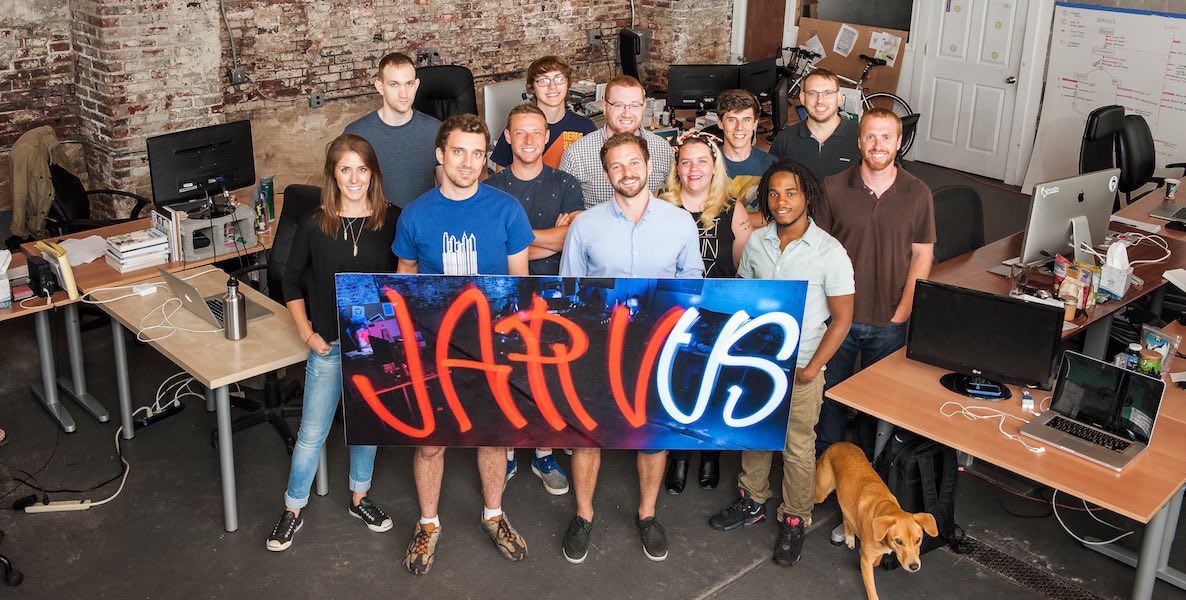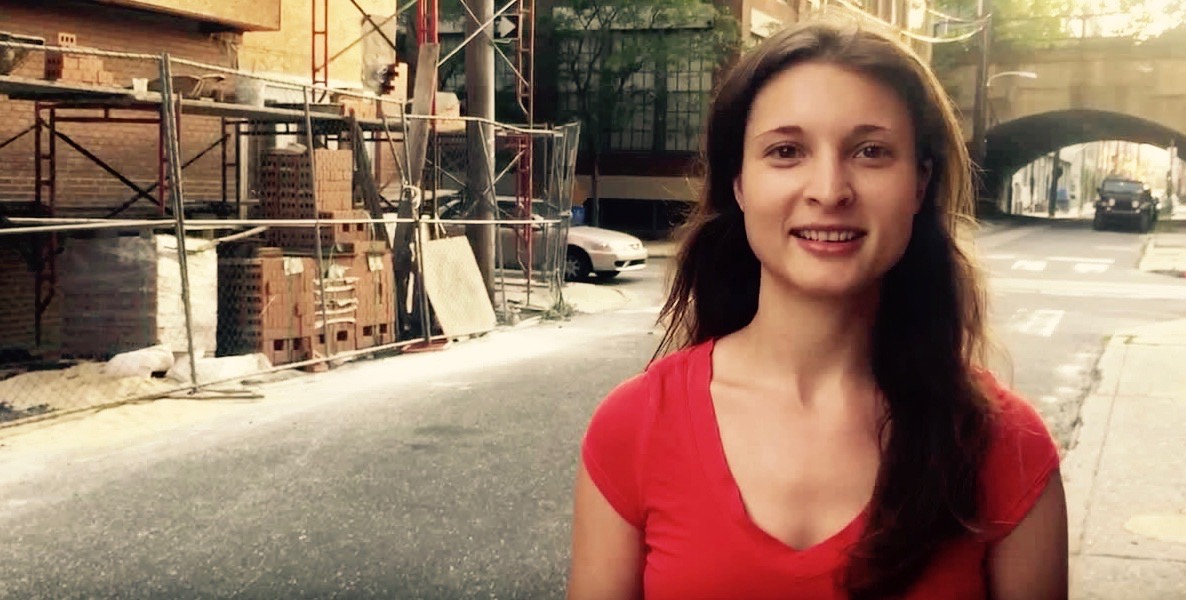FixList, the brainchild of 29-year-old open data geek Stacey Mosley, got its start in a decidedly ungeeky way. It was 2010 and Mosley had been laid off from TicketLeap, her first job out of college, and she had moved back in with Mom and Dad in Levittown. She’d take the R5 train into the city; looking out her window starting around the Fern Rock stop, she’d see widespread blight, shelled-out buildings with missing windows and doors. Surrounded by commuters numb to what she was taking in, Mosley couldn’t help but wonder: “Is anyone doing anything about this?”
So she stopped into City Hall one day and found herself talking to a senior citizen volunteer at the building’s Visitor Center. “Do you have a city org chart?” she asked the flummoxed woman, who was more accustomed to pointing visitors to nearby museums. Overhearing the exchange was Greta Greenberger, director of City Hall tours and wife of then-Commerce Director Alan Greenberger. Mosley not only peppered Greenberger with questions about redevelopment in Philly—who’s doing something about all those boarded up buildings?—she started to volunteer at the Visitor Center herself while attending housing programs and conferences throughout the city. At one, she put herself before Fran Burns, then the head of Licenses & Inspections, and asked for an informational interview.
That led to a job at L&I, which led to a position as a data scientist in the Nutter administration’s ground-breaking open data team. After five years in government, Mosley resigned last October, as it became clear that open data under the next mayor might not be quite as high a priority as under Nutter. She left to pursue her dream—hatched on that commuter train—to take on her city’s epidemic of blight, using her open data skills to empower private sector solutions.
The result is FixList, which launched in mid-May. It’s a Zillow-like subscription service that culls through the city’s open data and comes up with some 26 different criteria on over 600,000 real estate locations. FixList’s main differentiator is its “Redevelopment Score,” which ranks properties on their potential for revitalization. As she sees it, FixList can empower developers and neighborhood groups (who can use the service at a discounted rate) alike to help bring communities back.
Until now, municipal open data has been about government making itself more transparent by releasing voluminous data sets. Mosley realized that good government can’t be the end goal, that data without practical application is just more noise. The private and non-profit sectors are where government data can meet real world impact.
“The score is going to be low if it’s a brand new building in Rittenhouse,” Mosley says, in an unassuming, lilting voice that belies her disruptive nature. “It’s not meant to highlight ‘This is a great place.’ It’s meant to highlight ‘This is a great place to renew something.’”
Developers have long been driven essentially by gut instinct, especially in the wild west that passes for Philly’s real estate milieu. While at L&I, Mosley started to suspect that she had access to information that, smartly organized and presented, could make redevelopment less haphazard. She learned of a local window company that was searching city data and cross-tabbing it with historic property data to find historic properties that needed to have their windows replaced. “Light bulbs started going off,” Mosley says. “I was like, Oh my God, the business community can totally use this information to find new customers while at the same time fixing things the city is spending taxpayer money on. This is essentially market data.”
Enter FixList, where a curious developer or neighborhood association or nonprofit like Habitat for Humanity (at a 50 percent discount) can not only find Mosley’s proprietary Redevelopment Score, but also discover metrics gauging the accessibility of each property’s owner, its condition, how it’s changed over time, how it compares to the rest of its block, and histories of everything from neighborhood zoning changes to the number of city demolitions in the area. Mosley combs sources that include the Streets Department, the Office of Property Assessment, the departments of Parks and Recreation and her alma mater, Licenses and Inspections; the result is a holistic picture of redevelopment that no business or individual would have the expertise to ascertain on their own. There is at least one other company doing similar work—Brixsy, which provides real estate investors with information on property taxes, death records and violations—but FixList seems broader and more holistic. Mosley wants to help developers, yes, but also help the city manage redevelopment better.
In its first month, FixList signed up 24 paying clients, and Mosley, who has funded the company with her savings—she’s the sole employee—even spent much of the summer in conversation with three venture capitalist firms before deciding that, at least until fall, she’d continue to bootstrap. “Having creative control is hugely important to me,” she says. “I’m an engineer who also went to art school. I love to play and create things.”
Still, the decision to launch FixList wasn’t easy. “It took a long time to talk myself into it,” she says. “I kept telling myself, ‘Okay, there haven’t been many things you’ve done that you’ve failed at,’ and I had to just trust myself that I’m going to figure it out somehow.”
What she’s figured out is arguably the next critical step for the open data movement. Until now, municipal open data has been about government making itself more transparent by releasing voluminous data sets; under Nutter, the city released some inventive stuff, but it more often than not had the feel of preaching to the already converted. Mosley realized that good government can’t be the end goal, that data without practical application is just more noise. The private and non-profit sectors are where government data can meet real world impact.
Spend any time with Mosley, and you don’t come away with a picture of a hard charging entrepreneur. She doesn’t have the gregarious sales pitch you often come across in the startup world, even though she spends two-thirds of her time pitching to prospective clients. She isn’t selling so much as connecting, pausing thoughtfully and punctuating her story with nervous laughter, as though she can’t quite believe that she took the dive last fall and that this is her life.
But dive she did, and when you dig deeper, you find it in her genes. Her maternal grandfather, Herbert Rice, owned a textile conversion business in New York City. When a retailer in the garment district needed a particular leather, say, suppliers called Rice. He died when Mosley was 15, but she’d been at his knee, soaking up the nature of risk. “I loved watching him manage things,” she says. “I still have a messenger bag that’s a kind of security blanket. It’s made of a material he had the rights to and supplied J. Crew with for years. It has holes in it now.”
FixList’s main differentiator is its “Redevelopment Score,” which ranks properties on their potential for revitalization. As she sees it, FixList can empower developers and neighborhood groups (who can use the service at a discounted rate) alike to help bring communities back.
When I ask Mosley how she feels about Philly, her eyes widen. “I feel so much love!” she exclaims. She was an introverted kid, she says, and you can see that—there are remnants of a reserve that masks an iron will, no doubt inherited from her grandfather. “When I moved here, it felt like if there was a topic I was interested in, there was a group somewhere talking about it, and you just had to figure out where and it wouldn’t be all that exclusive to join them,” she says. “For someone like myself, with varying curiosities, whether it’s art, government or business, it was really welcoming.“
Around Philly these days, you often run into the Stacey Mosleys among us. They are part of the Yes, We Can generation, young men and women who, whether they were overtly political or not, got a sense of possibility during a high-minded presidential campaign eight years ago. They may have gotten turned off to politics in the intervening years, as the poetry of a movement gave way to the prose of actually governing.
Or, like Mosley, they may not have been heavily into politics at all, but something in the zeitgeist back then spawned this army of late twenty-somethings who marry wide-eyed idealism with unbridled ambition, naivete with practical skill sets. They think nothing of asking a volunteer at City Hall for an org chart, because someone had better be in charge of all those dilapidated buildings. As Stacey Mosley is telling me how she never found her social element in college, how Philly saved her, you start to get why she’s trying to save Philly now. She starts to tear up, and I cut her off. Are you getting emotional?
“Yeah,” she says, laughing, and then she says something that, on some level, is an expression of what cities are all about: “Because I came to Philadelphia and joined the board of Young Involved Philadelphia, and it allowed me to find other young people who didn’t know what the hell they were doing, either.”
Header photo: FixList






